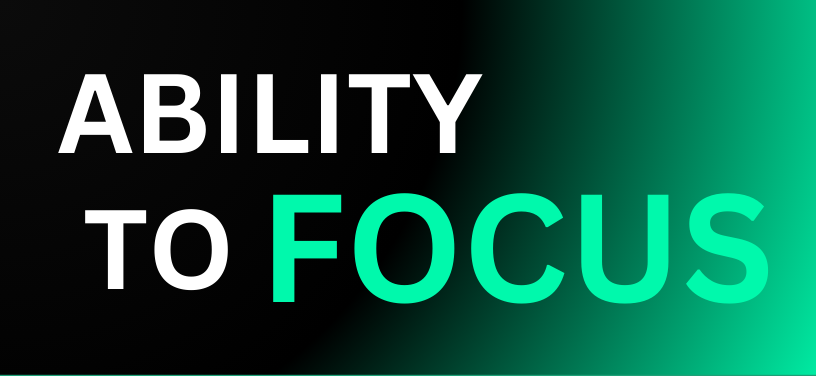
Ability To Focus
Share
Master Your Focus: The Complete Guide to Staying Productive
In today's hyperconnected world, maintaining focus feels like a superpower. With notifications constantly vying for our attention and endless digital distractions at our fingertips, how can we reclaim our productivity? Let's dive into practical strategies that will help you master your focus and transform your workday.
Understanding the Psychology of Focus
Our brains weren't designed for the constant interruptions of modern life. Every time we switch tasks or respond to a notification, we're forcing our minds to realign and refocus. This context switching doesn't just waste time – it depletes our mental energy and reduces our ability to concentrate deeply on important tasks.
Proven Techniques for Better Focus
The Pomodoro Method
This time-tested technique involves working in focused 25-minute intervals, followed by short breaks. It's surprisingly effective because it aligns with our brain's natural rhythm of focus and rest. Here's how to implement it:
- Choose one specific task
- Set a timer for 25 minutes
- Work without interruption until the timer rings
- Take a 5-minute break
- After four cycles, take a longer 15-30 minute break
Eat That Frog
Named after Mark Twain's famous quote, this technique involves tackling your most challenging task first thing in the morning. By completing your "frog" – that task you're most likely to procrastinate on – you'll set a productive tone for the entire day.
Creating Your Focus Haven
Your environment plays a crucial role in your ability to concentrate. Here's how to create a distraction-free workspace:
- Designate a specific work area: Whether it's a home office or a particular corner of your room
- Minimize visual clutter: Keep your workspace clean and organized
- Control your sound environment: Use noise-canceling headphones or background white noise if needed
- Optimize lighting: Natural light is best, but ensure your space is well-lit
Digital Minimalism in the Modern Workplace
Technology should serve you, not control you. Implement these strategies:
- Turn off non-essential notifications
- Use website blockers during focus sessions
- Schedule specific times for email and social media
- Adopt a "one screen" rule during focused work
The Lifestyle Foundation for Better Focus
Your ability to concentrate isn't just about willpower – it's deeply connected to your physical well-being:
Sleep
- Aim for 7-9 hours of quality sleep
- Maintain a consistent sleep schedule
- Create a relaxing bedtime routine
Nutrition
- Stay hydrated throughout the day
- Eat brain-boosting foods rich in omega-3s
- Limit caffeine to morning hours
Physical Activity
- Take regular movement breaks
- Exercise regularly to improve mental clarity
- Practice stress-reducing activities like meditation or yoga
Building Lasting Habits
The key to maintaining better focus is turning these strategies into habits. Start small:
- Choose one technique to implement
- Practice it consistently for 30 days
- Track your progress
- Gradually add more strategies
- Celebrate small wins
Taking Action
Remember, mastering your focus is a journey, not a destination. Start implementing these strategies today:
- Choose your most important task for tomorrow
- Set up your workspace for minimal distractions
- Download a Pomodoro timer app
- Plan your first focused work session
The ability to focus deeply is becoming increasingly rare and increasingly valuable. By implementing these strategies consistently, you'll develop a superpower that sets you apart in our distraction-filled world.
Your improved focus won't just help you get more done – it will reduce your stress, increase your satisfaction with your work, and give you more time for what truly matters in your life.
Ready to take control of your focus? Start with just one technique today. Your future self will thank you.

